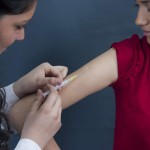Measles (Khasra)
Measles (khasra) is a highly contagious disease caused by virus. It is also known as Rubeola. It is one of the leading causes of death among children, despite the availibility of a safe and effective vaccine. It is an infection of the respiratory system caused by a virus, specifically a paramyxovirus. It is transmitted via droplets from the nose, mouth or throat of infected persons.
Symptoms
The classical signs and symptoms of measles include four-day fever(4 D's) and the three C's i.e:
Cough
Conjunctivitis
Coryza (common cold)
Cold-like symptoms, such as runny nose, watery eyes, swollen eyelids and sneezing
Red eyes and sensitivity to light
A mild to severe temperature, which may peak at over 40.6C (105F) for several days, then fall but go up again when the rash appears
Tiredness, irritability and general lack of energy
Aches and pains
Poor appetite
Tiny grayish-white spots (called Koplik's spots) in the mouth and throat
Causes
It is an infection of the respiratory system caused by a virus, specifically a paramyxovirus which is a single-stranded, negative-sense, enveloped RNA virus of the genus Morbillivirus within the family Paramyxoviridae. Humans are the natural hosts of the virus.
Diagnosis
Diagnosis of measles requires a history of fever of at least three days, with at least one of the three C's (cough, coryza, conjunctivitis).
Observation of Koplik's spots is also diagnostic of measles
Treatments
There is no specific treatment for measles. Most patients with uncomplicated measles will recover with rest and supportive treatment.
The following may relieve symptoms:
Acetaminophen (Tylenol)
Bed rest
Humidified air
It is, however, important to seek medical advice if the patient becomes more unwell, as they may be developing complications.
Preventions
Measles can be prevented through a vaccine called MMR(Measles, Mumps and Rubella) vaccine. Routine immunization is highly effective in prevention of measles.
The immunization for measles includes 2 doses wherein the first dose should be given between 12-15 months of age followed by the second dose after an interval of 4 weeks, usually up to 4-6 years.
However, in India the National Immunization schedule says, "The first dose should be given between 9-12months of age followed by the second dose between 16-24months of age along with DPT (Diptheria,Pertusis and Tetanus) booster dose, up to the age of 5years.
References:
Centre of Disease Control and Prevention
WHO
Vaccine India









